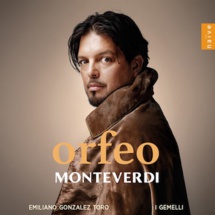A new entry into the Monteverdi L’Orfeo sweepstakes is always welcome; depending on the forces used, one gleans different colors and emphases from each performance. This new performance led by and starring tenor Emiliano Gonzalez Toro is honest and entertaining, and it’s a pity one has to compare it to some of the dozen other CD versions available. Sampling just three others for the sake of this review, this new one comes in fourth.
The version led by Emmanuelle Haïm on Virgin is red-blooded and dramatic while not being bloated at all; Ian Bostridge’s Orfeo can bring tears to the eyes. Andrew Parrott’s on Avie is a gorgeous re-creation of the probably-chamber-like first performance: intimate, delicate, and echt-musical with no melodrama but with, for example, a countertenor La Musica (unique on recordings) of such exquisite tone that it is music itself. Parrott also uses a=440; the others use a=465. Rinaldo Alessandrini leads a dramatic if bottom-heavy version on Naïve; the wonderful Furio Zanasi is a fine Orfeo, but he is a high baritone rather than a tenor, and so the center seems darker. Still, it’s a remarkable experience, with every mood change vividly presented, and diction pure and musical.
Here, under Toro, the 30 players (the largest ensemble of all sampled) of I Gemelli play stunningly, with the small wind section used only in the pastoral music and the chorus of eight voices alternating between lively, festive, and tragic, Greek-chorus utterances. The hearty continuo group–organ, harpsichord, triple harp, lute, theorbo, viola da gamba, and bass violin–to which there is added a modern copy of a ceterone (a relative of a chitarrone, a six-foot-long plucked instrument, which Monteverdi added to the Orfeo score), plays energetically and is recorded spotlessly. Call me a Philistine, but I did not notice the ceterone.
The playing and singing are never less than expert and a pleasure to hear, and Toro is a fine singer with handsome, manly tone, and he manages the tenderness of “Rosa del ciel” as gracefully as he handles the bizarre coloratura in “Possente spirto”. He explains in a note in the booklet that all of his tempos are chosen to relate to “Possente spirto” (the work’s centerpiece), which he takes very slowly. But I’m puzzled by this statement: the attendants at the wedding in Act 1 seem to be in a terrible hurry. How does this relate?
Emöke Barath’s Musica (she also sings Euridice) is good, but I’d have liked more pointed delivery from Natalie Pérez’s Messenger, upon whose utterances the rest of the opera depends. I also prefer darker voices for Caronte and Plutone. On the other hand, every time tenor Zachary Wilder shows up (first shepherd and spirit), one is won over.
I seem to be complaining a great deal about this release, which is not how I felt about it just listening to it through a couple of times. It’s a pleasure to listen to and if the competition were not so stiff, I’d feel more sanguine about it. Perhaps I should add something about an embarrassment of riches!
































